Centre for Evidence-based Policy Advice (IWH-CEP)

The Centre for Evidence-based Policy Advice (IWH-CEP) of the IWH was founded in 2014. It is a platform that bundles and structures activities in research, teaching, and policy advice. IWH-CEP pursues the objective of creating better foundations for a causal analysis of policy implemented across different sectors.
IWH-CEP is designed as a service unit and supports the activities in the research groups by providing access to a supra-regional research and policy advising network as well as access to data sets for causal analyses. IWH-CEP lies at the interface between three areas of responsibility and carries out coordination functions between them.
Tasks Team Events Projects Publications
IWH Subsidy Database Research Group "Evaluation of Subsidy Programmes"
The tasks of the IWH-CEP
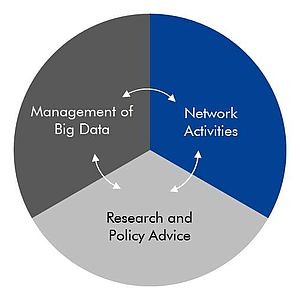
The government intervenes in the market mechanism through a lot of policy instruments in order to achieve various economic objectives. However, for policy makers, it is important to know whether the originally intended objectives are also achieved. Scientific methods can make a significant contribution to this. These are necessary to establish a clear connection between a policy instrument and its effect. Against this background, the Centre for Evidence-based Policy Advice (IWH-CEP) at the IWH was founded.
Research and Policy Advice
Research and policy advice are organized via the different research groups of the IWH. This organizational structure allows to assess policy changes from both a macro and micro perspective and cover different sectors of the economy.
To gain a better understanding of structural changes and economic growth, a first focus is set on the evaluation of subsidy programmes for firms and regions, for example, the Joint Task of "Improving the Regional Economic Structure" (which is the most important regional policy support scheme in Germany) and the measures envisaged by the Coal Regions Investment Act (InvKG) are being evaluated on behalf of federal and state governments. The objective of the projects is to use advanced evaluation techniques to assess the impact of policy support measures. The projects are carried out under the responsibility of the IWH Research Group "Evaluation of Subsidy Programmes".
A second key area includes analyses on regulatory reforms and effects. Especially having in mind that after the recent financial crisis, a re-regulation of the financial system took place, it is of utmost importance to evaluate the effectiveness of the reforms as well as to assess whether there are unintended side-effects. In the context of the project The Political Economy of the European Banking Union, researchers in the financial markets department study how the directives underlying the European Banking Union are implemented across member states as well as whether the new regulatory framework has implications for banking stability and financial intermediation.
Set-up of a Network
The IWH-CEP sees itself as part of various initiatives in the field of evidence-based economic policy. This is to ensure the unit's visibility and the awareness of the issue among the scientific and policy community.
Set-up and Maintenance of Databases
The major challenge in the analysis of effects of government interventions and regulatory changes lies in the accessibility of administrative data. IWH-CEP advances into this direction by building up databases that can be shared with other researchers.
Therefore, the IWH Subsidy Database is set up, maintained and completed according to the (current) specialisation in the analysis of effects of industrial policy support schemes. Information about the funded projects alone is not sufficient to conduct causal analyses – corporate data provided by official and commercial statistics must be added; this is organised using record linkage techniques. This task is carried out at the IWH Research Data Centre.
Additionally, the financial market department has set up the website International Banking Library, which is a web-based platform for the exchange of research outcomes on cross-border banking. It provides access to data sources, academic research on cross-border banking, both theoretical and empirical, as well as information on regulatory initiatives. Thus, the website provides researchers and policymakers with a comprehensive overview of available data to conduct policy evaluation and the current stance of the literature on regulation and supervision of financial markets. The quarterly newsletter summarizes recent developments and is appreciateted by both academics and central bankers.
The website of the International Banking Library also allows access to the Financial Markets Directives Database. This database provides information about financial markets regulation in Europe since the last financial and sovereign debt crisis. One key element is the harmonization of rules for capital regulation, bank resolution and deposit insurance on the way to the European banking and capital market union. The first element of the database provides data on the implementation of the Capital Markets Union in the European Union (see Emlein, M.; Sfrappini, E.; Tonzer, L.; Zgherea, C.: Capital Markets Union: Database of Directives and Regulations. IWH Technical Reports 2/2022).
Your Contact

Research Group Head
If you have any further questions please contact me.
+49 345 7753-861 Request per E-MailEvents
The IWH-CEP organises the annual transfer conference "From Transition to European Integration". Under a current topic, the event connects representatives from politics, ministries, authorities, associations and companies with scientists from the IWH and its partner institutions. The opening speech is given by a prominent politician. After scientific lectures and discussions, a panel discussion concludes the one-day conference. The event is designed for the dissemination of IWH's research findings among political decision-makers and administrative professionals. There is also media coverage.
Projects
FLEXPANELDID: Stata module to perform causal analysis of treatments with varying start dates and durations
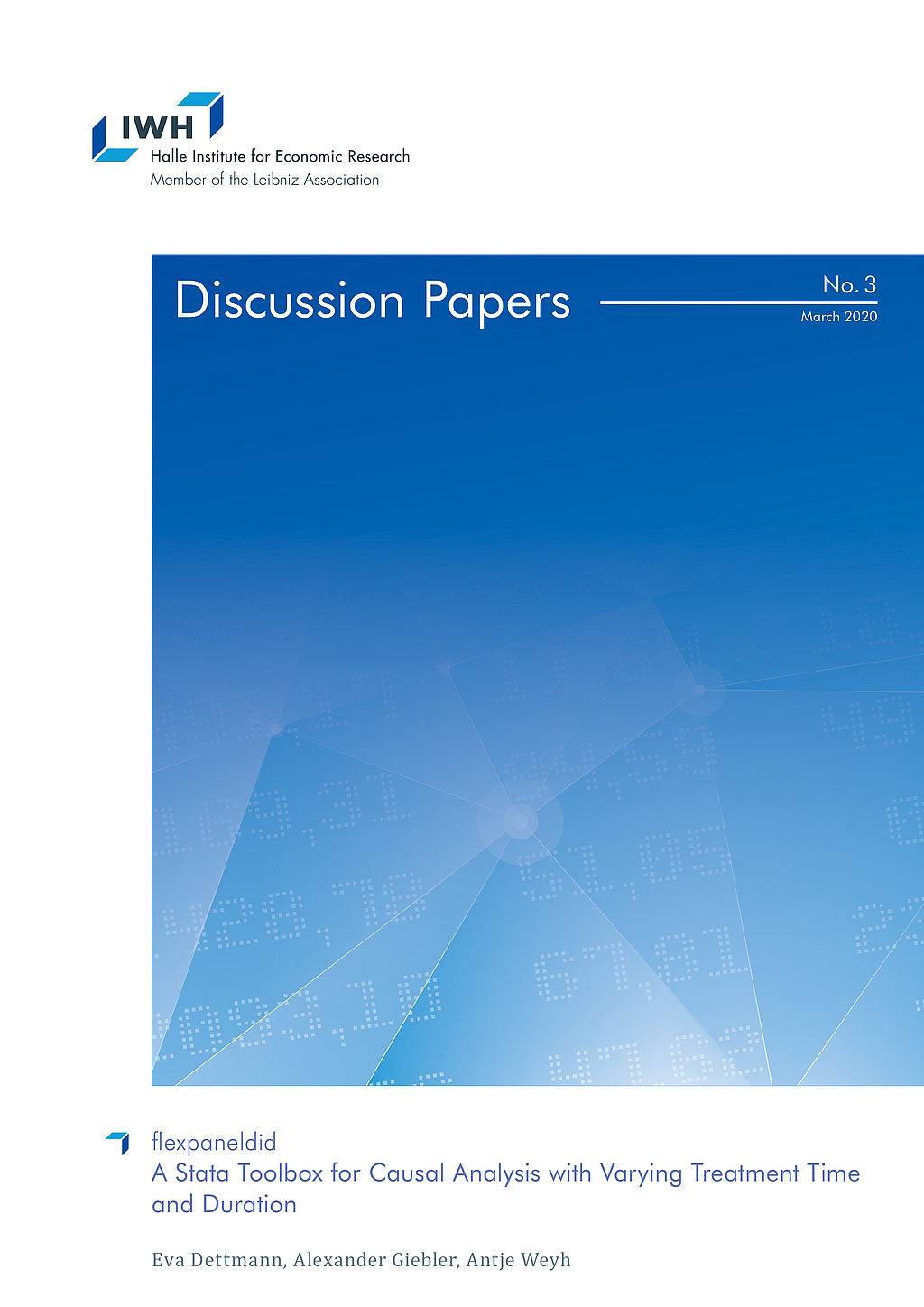
flexpaneldid: A Stata Toolbox for Causal Analysis with Varying Treatment Time and Duration
in: IWH Discussion Papers, No. 3, 2020
Abstract
The paper presents a modification of the matching and difference-in-differences approach of Heckman et al. (1998) for the staggered treatment adoption design and a Stata tool that implements the approach. This flexible conditional difference-in-differences approach is particularly useful for causal analysis of treatments with varying start dates and varying treatment durations. Introducing more flexibility enables the user to consider individual treatment periods for the treated observations and thus circumventing problems arising in canonical difference-in-differences approaches. The open-source flexpaneldid toolbox for Stata implements the developed approach and allows comprehensive robustness checks and quality tests. The core of the paper gives comprehensive examples to explain the use of the commands and its options on the basis of a publicly accessible data set.
09.2019 ‐ 09.2022
Establishing Evidence-based Evaluation Methods for Subsidy Programmes in Germany (EVA-KULT)
European Regional Development Fund (ERDF)
The project aims at expanding the Centre for Evidence-based Policy Advice at the Halle Institute for Economic Research (IWH-CEP).
Publications
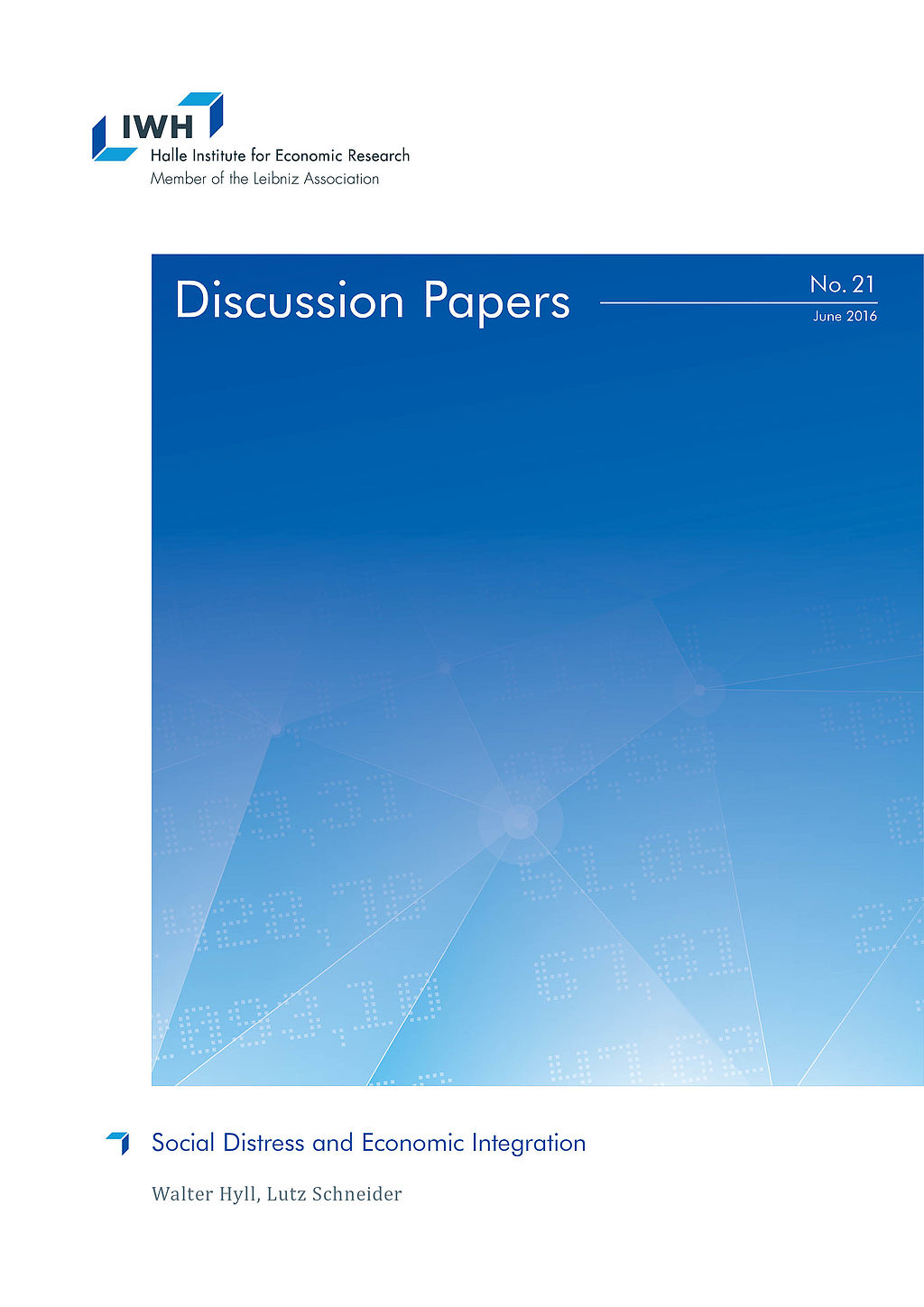
Subsidized Vocational Training: Stepping Stone or Trap? An Evaluation Study for East Germany
in: IWH Discussion Papers, No. 21, 2009
Abstract
The aim of this paper is to analyze whether the formally equal qualifications acquired during a subsidized vocational education induce equal employment opportunities compared to regular vocational training. Using replacement matching on the basis of a statistical distance function, we are able to control for selection effects resulting from different personal and profession-related characteristics, and thus, to identify an unbiased effect of the public support. Besides the ‘total effect’ of support, it is of special interest if the effect is stronger for subsidized youths in external training compared to persons in workplace-related training. The analysis is based on unique and very detailed data, the Youth Panel of the Halle Centre for Social Research (zsh). The results show that young people who successfully completed a subsidized vocational education are disadvantaged regarding their employment opportunities even when controlling for personal and profession-related influences on the employment prospects. Besides a quantitative effect, the analysis shows that the graduates of subsidized training work in slightly worse (underqualified) and worse paid jobs than the adolescents in the reference group. The comparison of both types of subsidized vocational training, however, does not confirm the expected stronger effect for youths in external vocational education compared to workplace-related training.
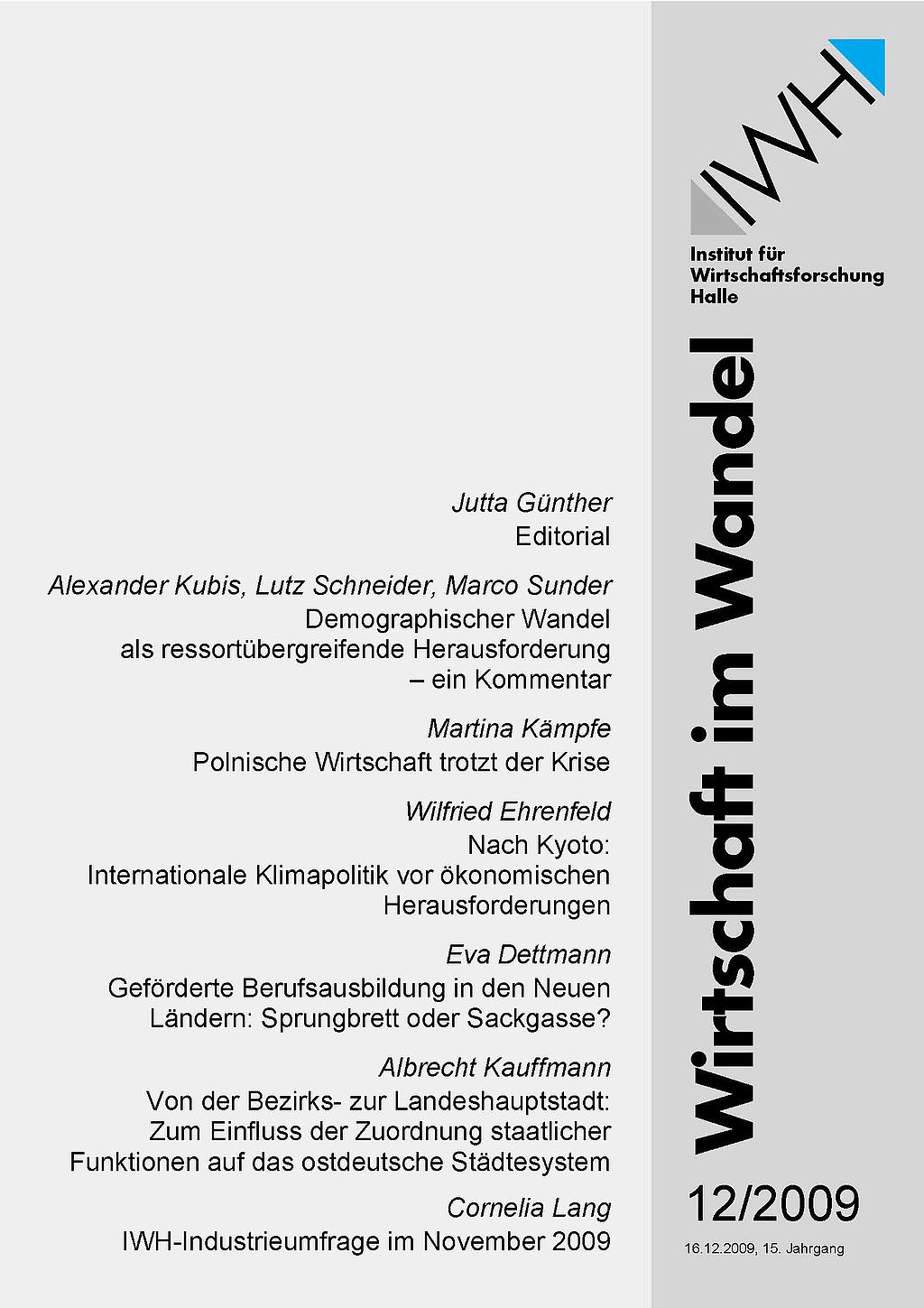
Subsidized Vocational Education in East Germany: Stepping Stone or Dead End?
in: Wirtschaft im Wandel, No. 12, 2009
Abstract
The aim of the study is to analyse whether the formally equal qualifications acquired during a subsidized vocational education induce equal employment opportunities compared to regular vocational training. This question is answered for adolescents in workplace-related training. Using replacement matching on the basis of a statistical distance function, we are able to control for selection effects resulting from different personal and profession-related characteristics and thus to identify an unbiased effect of the public support. The analysis is based on unique, very detailed data, the Youth Panel of the Halle Centre for Social Research (zsh). The results show that young people who successfully completed a workplace-related training are disadvantaged regarding their employment opportunities even when controlling for personal and profession-related influences. Besides a quantitative effect on the percentage of employed adolescents, the analysis shows differences in the job quality: The employed graduates of workplace-related training work in worse paid jobs, and less are employed in qualification adequate occupations compared to matchable graduates of regular vocational education.
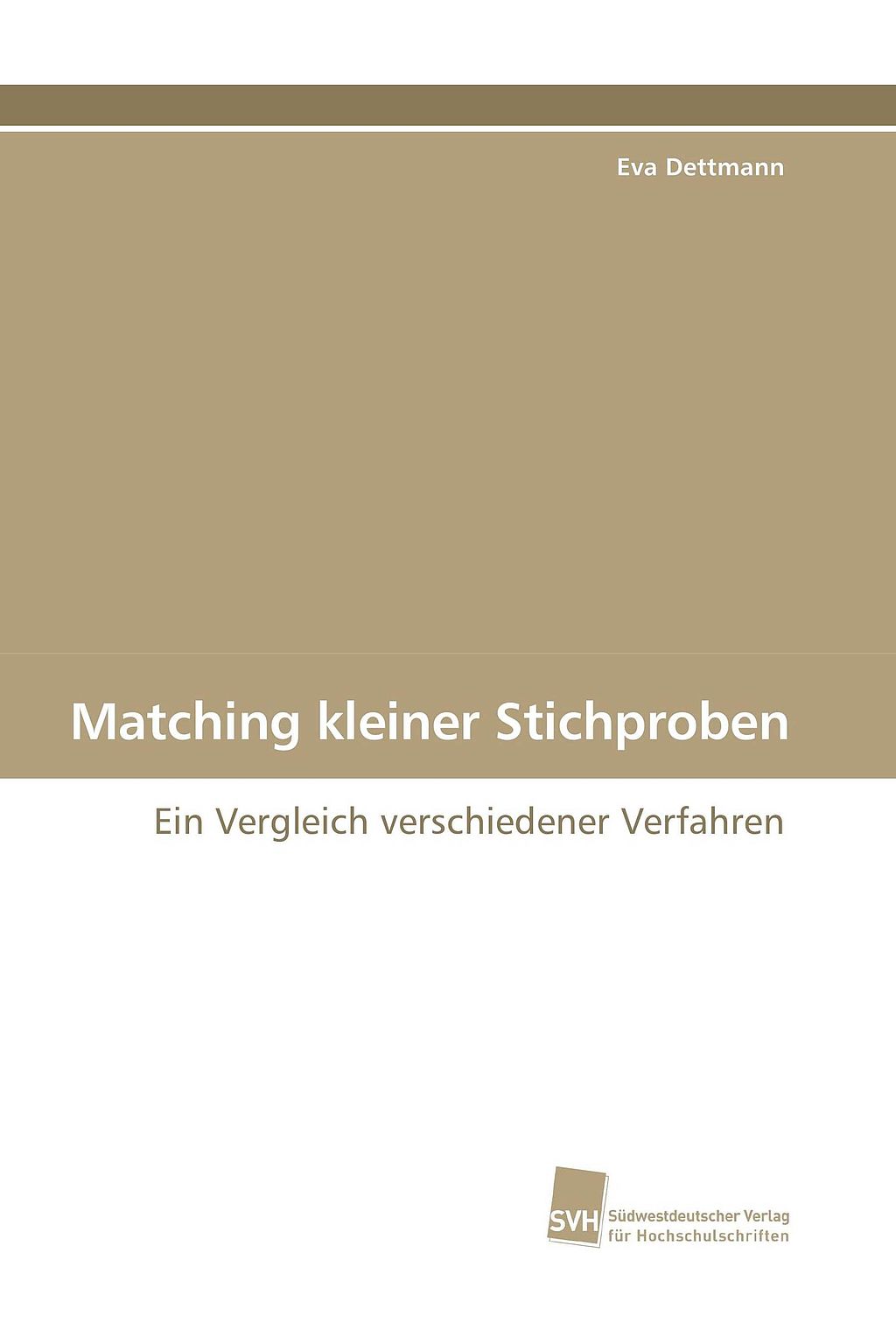
Matching kleiner Stichproben. Ein Vergleich verschiedener Verfahren
in: Saarbrücken, 2009
Abstract
Die Anwendung moderner Evaluationsverfahren ist aus der wissenschaftlichen Politikberatung nicht mehr wegzudenken. Unabhängig davon ist die Idee dieser Methoden auf viele Gebiete der Ökonomie und der Sozialwissenschaften übertragbar. Da die konkrete Fragestellung ebenso wie die verfügbaren Informationen die Eignung eines Verfahrens für den praktischen Einsatz beeinflusst, fällt die Auswahl der “richtigen“ Methode oft schwer. Die Studie ist als Beitrag zur Entwicklung von Richtlinien für den praktischen Einsatz speziell von Matchingverfahren zu sehen, dessen Ziel darin besteht, die diskutierten Methoden einem breiten Anwenderkreis zugänglich zu machen. Charakteristisch dabei ist ein enger Bezug zur praktischen Anwendung, der auch die Rahmenbedingungen für die durchgeführte Simulation vorgibt. Die Ergebnisse zeigen, dass es sich lohnt, bei der Wahl eines Matchingansatzes „über den Tellerrand zu schauen“ und bisher nur in anderen Wissenschaftsbereichen genutzte Verfahren eventuell anzupassen und für die Bildung von Vergleichsgruppen nutzbar zu machen. Dies gilt insbesondere für die Wahl eines geeigneten Distanzmaßes.
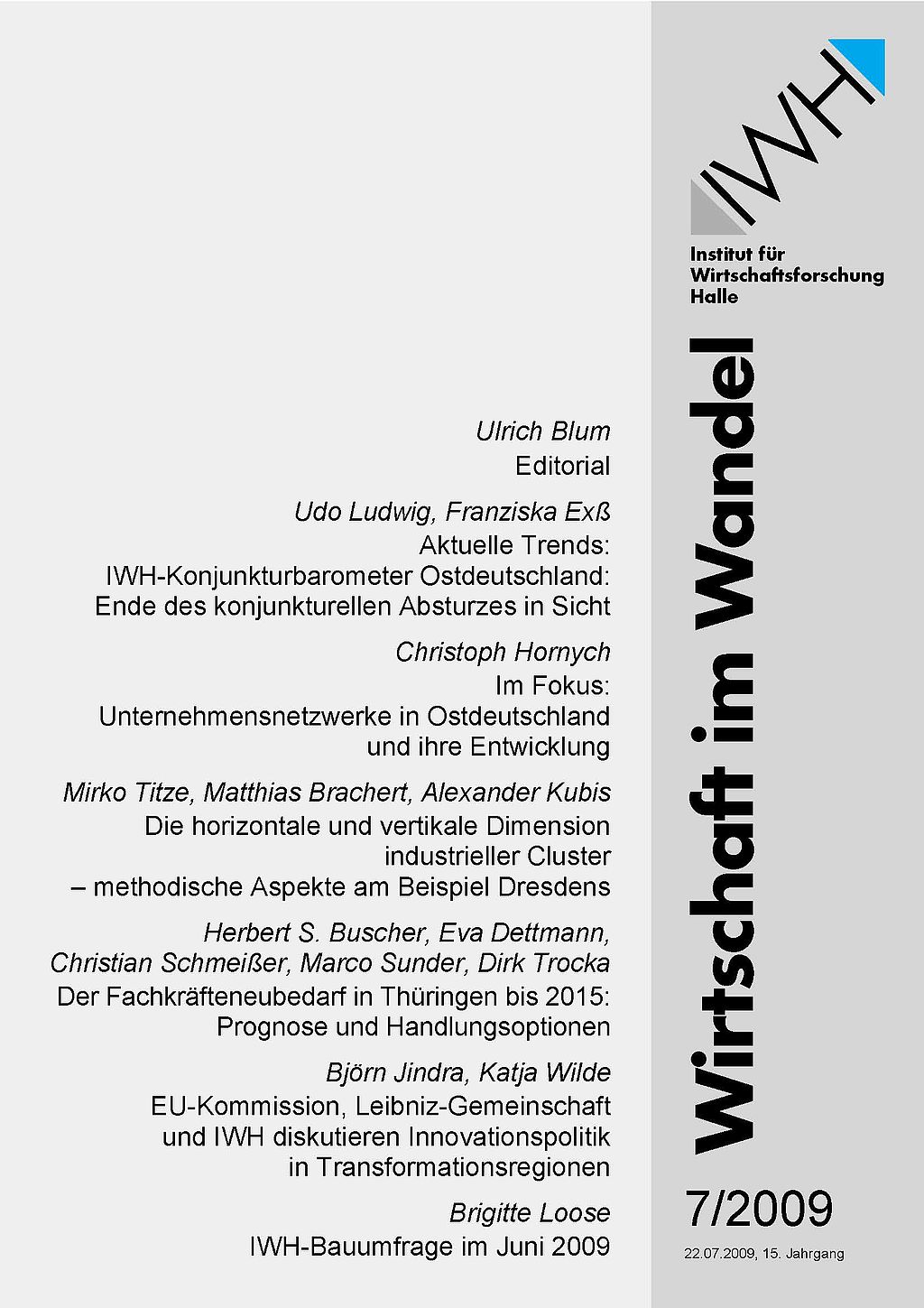
Die horizontale und vertikale Dimension industrieller Cluster – methodische Aspekte am Beispiel Dresdens
in: Wirtschaft im Wandel, No. 7, 2009
Abstract
Das Konzept industrieller Cluster verzeichnet stetige Attraktivitätsgewinne bei Akteuren regionaler Wirtschaftsförderung. Folgt man der Überlegung, dass das Clusterkonzept einen Ansatzpunkt zur Förderung der Wettbewerbsfähigkeit von Regionen bildet, so ist es in einem ersten Schritt notwendig, industrielle Cluster umfassend zu identifizieren. Bisherige Untersuchungen bedienen sich dazu einer methodischen Vielfalt. Sie reicht von spezifischen regionalen Fallstudien über Cluster-Mapping und Input-Output-Methoden bis hin zu verschiedenen Konzentrationsmaßen. Der folgende Beitrag orientiert sich an einer mehrdimensionalen Clusterdefinition und versucht, die verschiedenen methodischen Ansätze zusammenzuführen. Durch die Kombination der Verwendung von Konzentrationsmaßen, Input-Output-Methoden sowie regionalen Matrizen innovativer Wissensflüsse wird ein ganzheitlicher Ansatz zur Identifikation horizontaler und vertikaler industrieller Cluster vorgestellt. Dieser ermöglicht es, regionsspezifische und regionsübergreifende Clusterstrukturen zu identifizieren. Am Beispiel des Großraums Dresden zeigt sich, dass sich die wirtschaftliche Aktivität mehrheitlich auf die kreisfreie Stadt Dresden konzentriert. Übersehen wird jedoch oftmals die Bedeutung des Umlandes für die Wissensgenerierung in Kernstädten. Mit Hilfe einer regionalen Matrix innovativer Wissensflüsse lassen sich positive Effekte der Wissensgenerierung durch die Kragenkreise Dresdens darstellen. Diese Strukturen gilt es in einer umfassenden Identifikation industrieller Cluster zu beachten, damit alle Akteure der Wissensgenerierung in die Clusteridentifikation einbezogen werden.
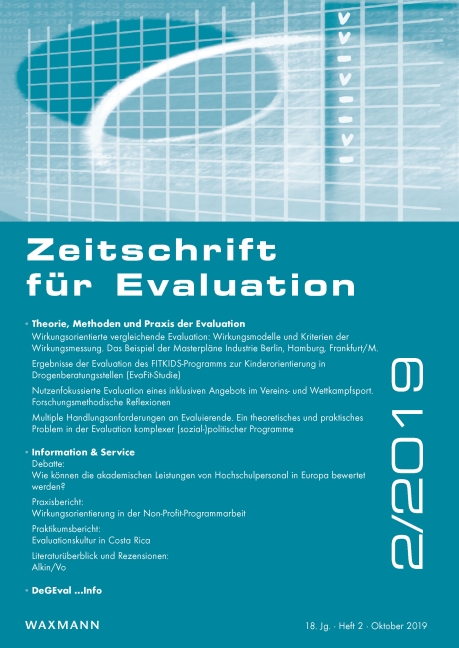
Microeconometric Evaluation and the Selection Bias – A practical Survey of Nonparametrical Solution Methods
in: Zeitschrift für Evaluation 2, No. 2, 2006
Abstract
The application of evaluation strategies becomes more important in various fields of study. The problem of self-selection associated with microeconomic evaluation can be solved in different ways, but nonparametrical solutions are most popular. The study gives an overview of nonparametrical solution methods for this problem. The aim is to close the gap between introductory and the more sophisticated literature and to give some practical guidance for the choice of the appropriate method for empirical application. The assumptions as well as advantages and drawbacks for empirical application and the requirements to the data base are described for every approach. It becomes clear that there is no ‘magic bullet’. For an unbiased estimation the assumptions have to be fulfilled and the data at hand must be compatible with the respective method.

Microeconometric Evaluation of Selected ESF-funded ALMP-Programmes
in: IWH Discussion Papers, No. 17, 2006
Abstract
The study evaluates different ESF-funded labour market programmes by comparing the labour market status at different points in time after the treatment. In order to solve the selection problem we employ a standard matching algorithm with a multi-dimensional distance measure. The effects of the analyzed programmes (wage subsidies, start-up subsidies and qualification measures for recipients of social welfare) are very heterogeneous. It can be observed that the direct integration into the regular labour market provides an advantage for the supported individuals. Its lasting effects, however, strongly depend on the group of persons being supported, the type of treatment and the employers’ financial share.











